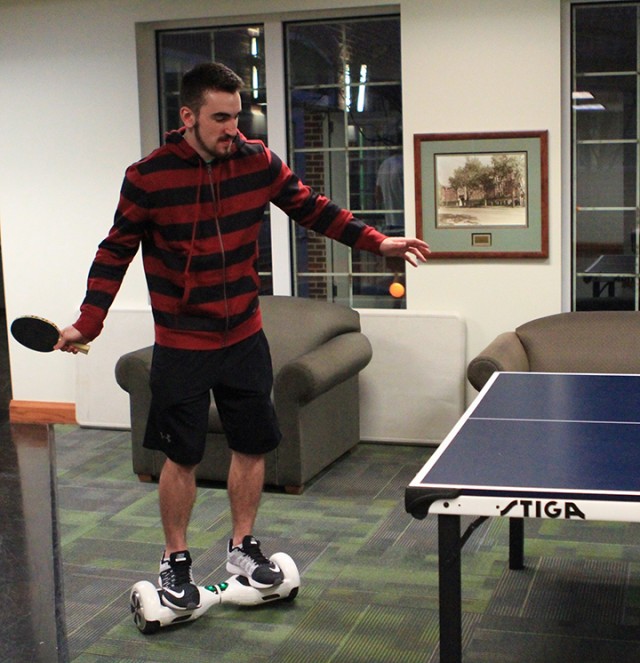By Heather Trotter Lariat Reporter
WACO, TX – Celebrities on social media have sparked a new trend among college students and young people: hoverboards. They can be seen on college campuses, in airports, malls and other areas where college-aged people frequent.
Hoverboards are self-balancing scooters. They run on rechargeable batteries and are controlled by the rider leaning forward or backward, depending on how fast or slow the rider wants to go. The scooters come in a wide variety of colors and can range from $250 to $900.
Despite their recent popularity, hoverboards have come under scrutiny for safety hazards. Some have caught on fire and sent riders to the hospital, and several companies have begun to recall them for mechanical issues.
Universities in Texas have even begun to ban the use of hoverboards as transportation and even in dorm rooms, due to the increase in accidents. Texas State University is one of many to bring the hammer down on students and owners of these hoverboards.
League City, freshman, Drew Chronister who attends Texas State has even decided to just leave his hoverboard at home because of the inconvenience.
“I was at home for the Christmas holiday when I received an email about how they banned them in the dorms and on campus due to the safety hazard of them catching fire,” Chronister said. “I used mine for transportation purposes since there is a significant difference in walking to class in 15 minutes and riding my hoverboard for about five to seven.”
Recent Baylor University graduate Allex Austin rode his hoverboard on campus to get to and from class. When asked if he has had problems with his hoverboard, Austin said: “besides falling off, no,” he hasn’t had any technical difficulties.
Austin said he was only able to list one positive aspect about the hoverboard: the rider can get from point A to point B a little faster. When asked about the negative aspects, his list went on and on.
“They’re expensive and heavy. They aren’t made for rough terrain. They don’t fit certain people well- I have big feet so it’s hard to ride,” Austin said. “You realize how useless they really are so they just sit in your room and collect dust.”
Hoverboards may be the new trend, but that isn’t stopping them from being banned. Colleges such as the University of New Hampshire and the University of Virginia; airlines including Delta and American; and even the city of New York have banned the self-balancing scooters in an effort to curb the number of accidents that are caused due to riders falling off the scooters or the scooters catching on fire.
Baylor’s campus has yet to make a rule mandating that hoverboards be left at home. However the Simpson Center at Highers Athletic Complex has banned the self-balancing scooters.
Bart Byrd, assistant athletic director of Baylor Student Athlete Services, the man who made the call on the hoverboards, could not be reached for a comment about them being banned at the Simpson Center.
Highers isn’t the only athletic center to ban hoverboards. According to ESPN, the Carolina Panthers professional football team has banned hoverboards inside their stadium and their locker room for the safety of their players.
Baylor student Ali Sohani said he hasn’t run into any problems riding his hoverboard at different places.
“People have been riding them everywhere, even while grocery shopping like in HEB,” Sohani said. “Teachers haven’t even stopped me.”
He said he hopes that Baylor won’t make the decision to ban hoverboards from campus.
As of now, hoverboards will continue to be seen as one of the modes of transportation used by Baylor students.


